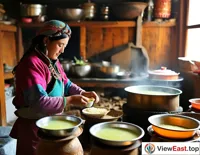






A: A Journey Through the Culture and Flavor of Highland Barley Wine
Tibet, a land of mystery and antiquity, has given birth to a unique beverage—Highland Barley Wine. It is not only an indispensable part of the daily life of the Tibetan people but also a symbol of plateau culture. Highland Barley Wine, with its distinctive cultural background, rich nutritional value, and unique taste, has become an important window into exploring Tibetan culture.
Cultural Background
The history of Highland Barley Wine dates back to ancient times and is a creation of the Tibetan people through their long-term production and life. It is not only a necessary beverage for festivals and religious ceremonies but also a flavoring agent in daily life. In Tibetan culture, Highland Barley Wine symbolizes auspiciousness, happiness, and health.
Features and Taste
The distinctive feature of Highland Barley Wine lies in its unique ingredient—highland barley, a grain that is cold and drought-resistant, growing in areas above 3000 meters in altitude. Highland Barley Wine has a rich taste with a slight sweetness and a hint of sourness, a soft texture, and a lingering aftertaste.
Appearance
Highland Barley Wine is usually golden yellow, clear and transparent, like the lakes on the plateau, giving a fresh and refined feeling.
Nutritional Value
Highland barley is rich in protein, dietary fiber, vitamins, and minerals. After fermentation, Highland Barley Wine not only retains these nutrients but also increases probiotics, which are beneficial for digestion and enhancing immunity.
A: The Production Process of Highland Barley Wine
Introduction of Ingredients
The main ingredient is highland barley, and other necessary ingredients include water and koji (fermentation starter).
Production Tools
Traditional production tools include stone mills, pottery jars, wooden barrels, etc.
Ingredient Preparation
Clean the highland barley and soak it overnight.
Drain and dry the soaked barley and grind it into flour.
Cooking Steps
Mix the barley flour with water and heat until it becomes a paste.
After cooling, add the koji and mix well.
Place the mixture into a pottery jar and seal it for fermentation.
The fermentation time is usually 7-10 days, during which regular checks are required.
After fermentation is complete, filter the wine liquid and it is ready to drink.
Seasoning Techniques
The seasoning of Highland Barley Wine mainly relies on the fermentation process of the koji, but natural spices such as saffron and cloves can also be added to enhance the flavor.
Consumption Suggestions
Highland Barley Wine is best consumed at room temperature or can be warmed up for consumption, but it should not be boiled to avoid damaging the nutrients.